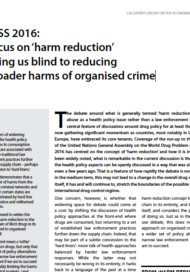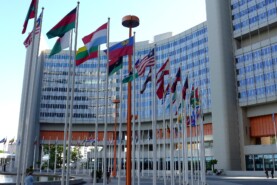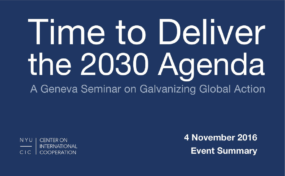Posted on 28 Apr 2016
A lacklustre United Nations summit on the world drug problem – known as UNGASS – limped to a close this week. There was a rush to get the outcome document signed off on the first day, presumably to keep dissenters from stirring up any trouble. While offering lip service to health and access to medicines, the final document is out of step with popular sentiment. Rather than inspiring a call for more humane and just drug policy, it doubles down on the status quo.
UNGASS is a missed opportunity. The outcome document does not propose ending the criminalization of users, much less capital punishment for drug-related offences. Nor does it request the World Health Organization to review drug scheduling based on hard scientific evidence. The document also fails to issue pragmatic recommendations to guarantee treatment for users and says nothing about regulation – the surest pathway to progressive drug-policy reform.
The many shortcomings of the outcome document are due to the flawed process by which the text was drafted. There are at least four mistakes that must be fixed in the lead-up to the next world gathering to discuss “the drug problem” in 2019. Canada, whose new government is committed to legalizing recreational marijuana by 2017, could lead the charge. If the reaction to Health Minister Jane Philpott’s barnstormer of a speech in the UN General Assembly is anything to go by, many countries are ready to follow.
First, the UN’s Commission on Narcotics (CND) is not the most appropriate entity to lead the process of meaningful drug-policy reform. The CND’s primary responsibility is to safeguard the three narcotics conventions established in 1961, 1971 and 1988. It is made up of 53 members – including China, Egypt, Indonesia and Russia – who are staunchly opposed to rebalancing global drug policy. The CND is committed to the absurdity of a “drug-free world.”
Second, future negotiations on global drug-policy reform should be more responsive to the diverse interests and needs of governments and societies around the world. Instead of being open and transparent, the drafting process was a closed-door affair. Inputs from non-CND members were routinely excluded. By the time the drafting process concluded on March 23, the outcome document was regarded as lacking legitimacy.
Third, the UN Office for Drugs and Crime (UNODC) should not be put in charge of future negotiations. The CND appointed the UNODC to gather inputs on the final outcome document. The UNODC adopted a criminal-justice approach. This is hardly surprising – these goals are literally inscribed in its mandate. As a result, the contributions of other UN agencies working on health, gender, human rights and development were given short shrift.
Fourth, it is essential that civil society assume a more prominent seat at the table in future negotiation rounds. In the leadup to UNGASS, many non-governmental organizations were literally shut out from key meetings. On the first day of the actual UNGASS summit, dozens of civil-society groups were denied entry to the UN on the spurious grounds of “heightened security risks.” Incredibly, a widely publicized letter advocating the end of prohibition and signed by more than 1,000 leaders was confiscated by security personnel.
The UNGASS is out of step with changes occurring around the world. But instead of facing up to new and urgent threats, the outcome document instead reaffirms the international narcotics conventions as the cornerstone of global drug policy. The same document triumphantly declares “tangible success” in the war on drugs, but there is decidedly little evidence of these positive impacts. To the contrary, illicit narcotics production and trafficking continues to flourish. Drug-related violence persists. Organized crime is as strong as it’s ever been.
UNGASS is at odds with the transformations under way around the globe. More and more governments are offering opioid-substitution treatment, decriminalizing consumption and regulating drugs for medical and recreational purposes. As they do, the flaws of the international drug-control system are becoming harder to ignore. There is a danger that the UN – and especially the CND – continues to deny evidence of the overwhelming failure of prohibitionist policies. If it does not change course, then the multilateral drug-control regime may collapse. Indeed, it may already be too broken and fragmented to salvage.
This op-ed was authored by Global Initiative Network Member, Robert Muggah, who directs research at the Igarapé Institute and the SecDev Foundation. He also advises the Global Commission on Drug Policy. Originally published in the Globe and Mail, 22nd April 2016.



